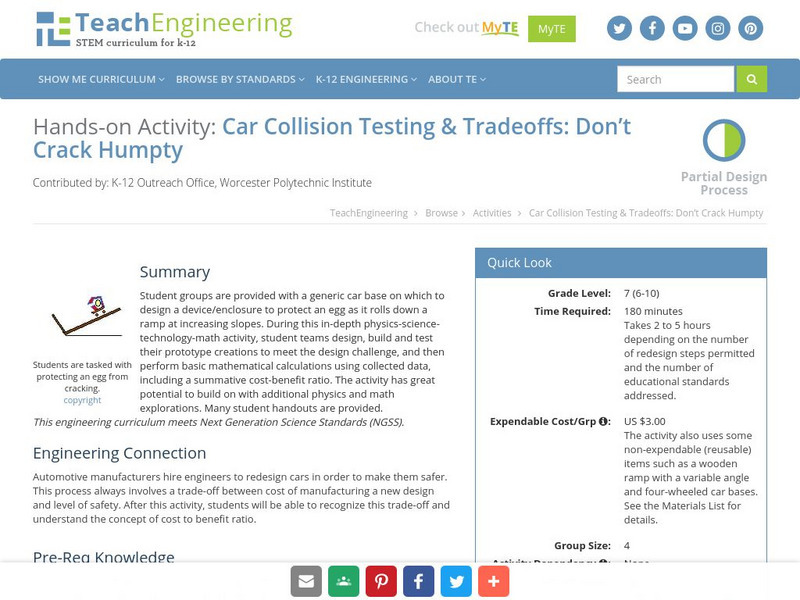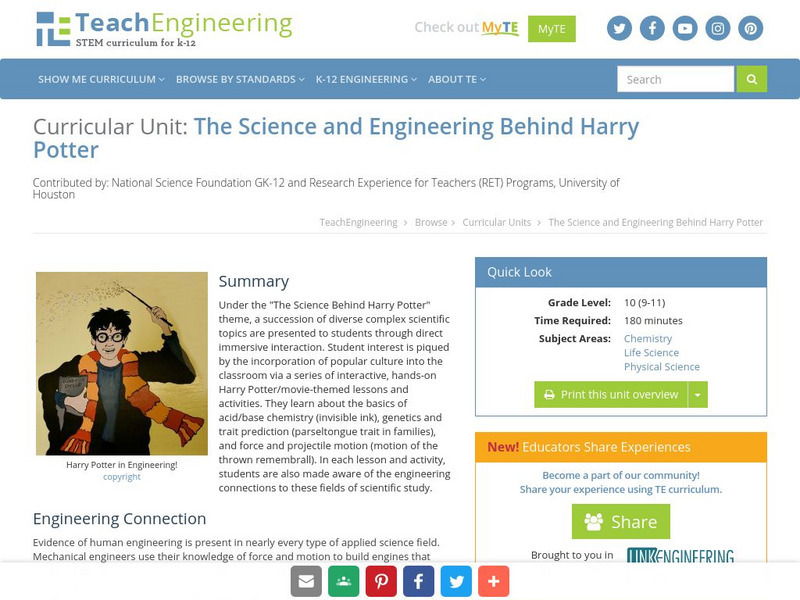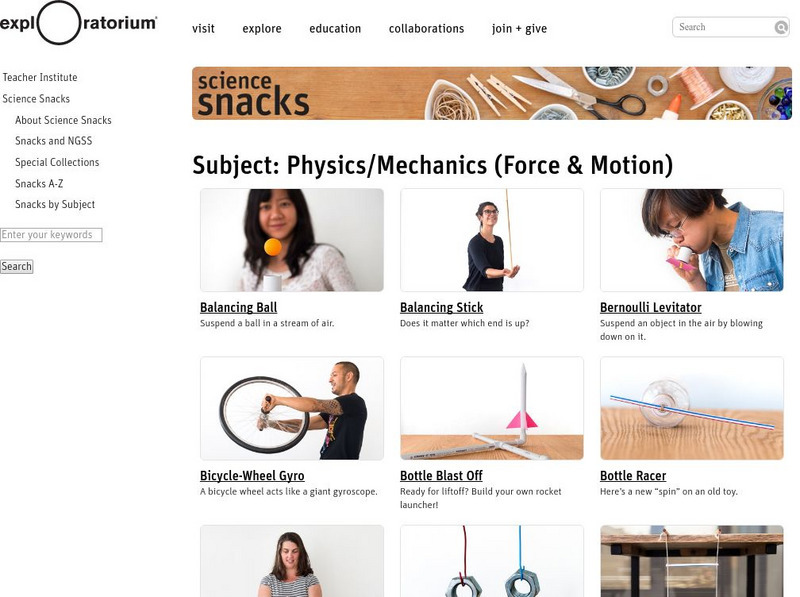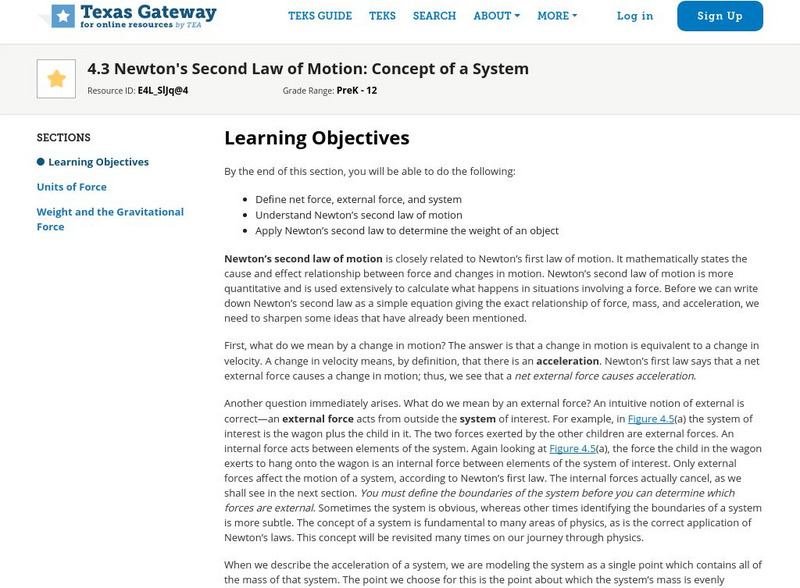TeachEngineering
Teach Engineering: What's Up With All This Traffic?
Expanding on the topic of objects in motion covering Newton's laws of motion, acceleration and velocity, which are taught starting in third grade, students are introduced to new concepts of speed, density, level of service (LOS) (quality...
Texas Education Agency
Texas Gateway: Introduction to Motion
What do you think of when you hear the word motion? Are you moving right now? You may not think so, but you are. Remember, the Earth is moving around the Sun, and the Sun is moving around the Milky Way Galaxy. Everything in the universe...
Physics Classroom
The Physics Classroom: Elephant and Feather: Air Resistance
The concept of air resistance is discussed in terms of why a heavier object falls faster than a lighter object when both dropped from the same height. In this discussion and animation, an elephant and feather are used as examples.
University of St. Andrews (UK)
University of St. Andrews: Albert Einstein
A truly complete biography of the great man. Some adequate discussion of his theoretical and scientific work, but the accent here is on his personal life. Many anecdotes, many quotes from him, many references and hotlinks to other...
PBS
Nova: Missing in Mi G Alley: All About G Forces
Students learn about G forces. The resource discusses gravity forces, fainting in the air, acceleration, and zero G?s.
TeachEngineering
Teach Engineering: Car Collision Testing & Tradeoffs: Don't Crack Humpty
Student groups are provided with a generic car base on which to design a device/enclosure to protect an egg as it rolls down a ramp at increasing slopes. During this activity, student teams design, build and test their prototype...
TeachEngineering
Teach Engineering: Engineering Out of Harry Situations
Under the "The Science Behind Harry Potter" theme, a succession of diverse complex scientific topics are presented to students through direct immersive interaction. Student interest is piqued by the incorporation of popular culture into...
Exploratorium
Exploratorium: Science Snacks: Physics/mechanics (Force and Motion)
A collection of mechanics activities. Many pertain to Newton's laws of motion. Step-by-step directions provided with illustrations. Great for teacher demos or student projects.
Texas Education Agency
Texas Gateway: Objects in Motion
This resource provides flexible alternate or additional learning activities for students learning about the concepts of distance, speed, and acceleration.
Texas Education Agency
Texas Gateway: Speed, Velocity, and Acceleration
Given descriptions, illustrations, graphs, charts, or equations, students will differentiate between speed, velocity, and acceleration.
Texas Education Agency
Texas Gateway: Types of Motion
Students will distinguish between and/or interpret the types of motion.
Texas Education Agency
Texas Gateway: Changes in Motion
Given diagrams or scenarios, students will measure and graph changes in motion.
Other
Rotational Dynamics
Excellent site explaining rotational dynamics including work. Site includes links to related topics.
Paul Dawkins
Paul's Online Notes: Velocity and Acceleration
Interactive notes with links to previous concepts, examples, and solutions.
Physics Classroom
The Physics Classroom: Vectors and Direction
A complete lesson/tutorial on vectors. Learn about vector addition, vector resolution, vector components, and resultants. Numerous examples and learning exercises are provided.
Science Struck
Science Struck: What Is Gravity and How Does It Work
A very detailed look at gravitational force and the many theories that have been put forward to try to explain it. Includes lots of illustrations.
Physics Classroom
The Physics Classroom: Newton's Laws
A four-lesson e-textbook covering topics in Newton's Laws. Tutorials include informational text,animations, interactive activities, and quick, interactive comprehension checks throughout the lessons.
Physics Classroom
The Physics Classroom: Vectors: Inclined Planes
Through examples and interactive practice problems, this physics tutorial helps students understand how forces behave on an object on an inclined plane.
NASA
Nasa: Model Rocket
A comprehensive tutorial that depicts the parts of a subsystem within a system. This tutorial dissects a rocket and explains how each part is integral to its actual functioning. Excellent links to otherresources dealing with aerodynamics.
TeachEngineering
Teach Engineering: Projectile Motion
Students are introduced to the concept of projectile motion, of which they are often familiar from life experiences,such as playing sports such as basketball or baseball, even though they may not understand the physics involved. Students...
Texas Education Agency
Texas Gateway: Motion Equations for Constant Acceleration in One Dimension
By the end of this section, you will be able to do the following: Calculate displacement of an object that is not accelerating, given initial position and velocity; Calculate final velocity of an accelerating object, given initial...
Texas Education Agency
Texas Gateway: 4.3 Newton's Second Law of Motion: Concept of a System
By the end of this section, you will be able to define net force, external force, and system; understand Newton's second law of motion; and apply Newton's second law to determine the weight of an object.
Physics Classroom
The Physics Classroom: Acceleration
Topics covered include what acceleration is, the difference between constant and non-constant acceleration, acceleration in a free-falling object, the equation used to compute acceleration, and the difference between positive and...
CK-12 Foundation
Ck 12 Exploration Series: Simulations: Physics: Model Rocket
[Free Registration/Login Required] Learn about the relationship between position and velocity for a model rocket during launch and in free-fall. Experiment with rocket mass, rocket thrust, and rocket burn time to understand the...

















